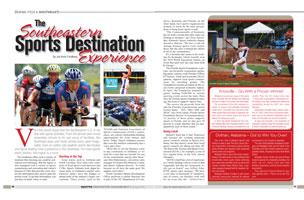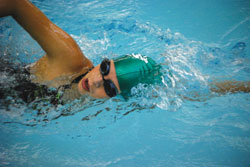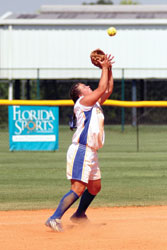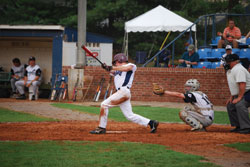
 Very few would argue that the Southeastern U.S. is not ripe with sports activities. From the almost year-round amenable climate to its vast array of facilities, the Southeast plays and hosts almost every sport imaginable. Even so-called cold weather sports like hockey and figure skating have a presence in the Southeast. For most sports event owners, this region is a must.
Very few would argue that the Southeastern U.S. is not ripe with sports activities. From the almost year-round amenable climate to its vast array of facilities, the Southeast plays and hosts almost every sport imaginable. Even so-called cold weather sports like hockey and figure skating have a presence in the Southeast. For most sports event owners, this region is a must.
The Southeast offers such a variety of locations that choosing one could be considered overwhelming. But the region is also equipped with a variety of sports commissions and convention and visitor's bureaus (CVBs)that provide event owners the information they need to plan the perfect event. To get that information, you just have to know where to start.
Starting at the Top
Some states, such as Alabama and North Carolina, have state-wide coalitions of local sports event directors and CVBs. Sports Alabama took shape because many of Alabama's smaller communities didn't have the budget to attend some of the industry's larger conventions. These events, such as the TEAMS and National Association of Sports Commissions (NASC) conferences, are critical relationship-building opportunities for event owners and hosts. Today, Sports Alabama ensures that even the smallest community has a voice and a face.
"We'd like to see the business come to any community in Alabama, so we look for events that are feasible for one of our communities and go after them," says Don Dukemineer, convention sales manager for Huntsville/Madison County and Sports Alabama director. "It works because we all have the same goal. We support each other."
 North Carolina's Sports Development Office performs a similar function, but is part of the N.C. Department of Commerce. Kentucky and Florida, on the other hand, have sports organizations created, or hired, by the state government to bring home sports events.
North Carolina's Sports Development Office performs a similar function, but is part of the N.C. Department of Commerce. Kentucky and Florida, on the other hand, have sports organizations created, or hired, by the state government to bring home sports events.
"The Commonwealth of Kentucky has set forth a model that other states are looking to emulate," says Terry Hasseltine, Kentucky Sports Authority deputy executive director. "We have a real advantage because sports event owners know that the state is behind the efforts of all of our communities."
It's a formula that seems to be working for Kentucky, which recently won the 2010 World Equestrian Games, an event that until now has only be held in Europe.
The Florida Sports Foundation, a private, not-for-profit corporation operating under contract with Florida's Office of Tourism, Trade and Economic Development, supports local sports commissions by awarding grants. The Foundation's awards are based on the local events' projected economic impact. In April, the Foundation awarded 23 grants totaling $100,000 to various sporting events across the state. How does the Florida Sports Foundation manage this kind of support? Sports fans.
"We receive the proceeds from the sale [in Florida] of professional sports license plates - NFL,NBA, NHL and MLB," says Nick Gandy, Florida Sports Foundation director of communications. "A portion of those plates supports sports in Florida, and we also give 10 percent to youth charities that are designated by each of those teams."
Going Local
Industry buzz has it that Tennessee and Georgia are creating statewide sports councils similar to Sports Alabama, but that doesn't mean their local sports councils are taking any time off. The Knoxville Tourism and Sports Commission (KTSC), for example, is one of five regular hosts of the AAU Junior Olympics.
 "[KTSC] itself has a lot of experience as a whole dealing with an event of that magnitude, but also the community really got on board," says Jeffrey John, KTSC sports sales manager. "We have a core base of thousands of volunteers, and of course, our facilities work well for an event like the Junior Olympics."
"[KTSC] itself has a lot of experience as a whole dealing with an event of that magnitude, but also the community really got on board," says Jeffrey John, KTSC sports sales manager. "We have a core base of thousands of volunteers, and of course, our facilities work well for an event like the Junior Olympics."
Atlanta is one of the Southeast's largest markets and a key location for many sporting events, but it's certainly not the only game in town. Georgia is rich with communities, such as Gwinnett and Cobb Counties, that are close to Atlanta's amenities and whose sports commissions annually host a variety of events, large and small.
Sports as Tourism
Considering the Southeast's mild winters, hundreds of golf courses, the Appalachian Trail and thousands of miles of coastline, lakes and rivers, it's no surprise that sports are considered part of the tourism industry in many locations. In these states, sports-event recruitment is often a function of the state,regional or local CVB.
In Mississippi, event owners can browse all the state's sports venues on the Mississippi Division of Tourism's Web site. Regional and local organizations, such as the Mississippi Gulf Coast CVB, offer event owners on-the-ground assistance and event management.
"Our biggest assets in Mississippi are our hospitality and sense of community," says Neal McCoy, Tupelo CVB sports development director. "We're not going to have the biggest cities with the biggest markets, but we are going to have enthusiastic volunteers and media who will come out to your event."
 Sports Tourism, as it is referenced, is growing in prominence in other states as well, including Virginia, South Carolina and Louisiana.
Sports Tourism, as it is referenced, is growing in prominence in other states as well, including Virginia, South Carolina and Louisiana.
The Gulf Coast enjoys a unique camaraderie, with CVBs all along the coast working together.
"We work closely with our friends all along the Gulf Coast," says Todd Whalley, director of sales for the Louisiana Northshore CVB. "In fact, we found ourselves hosting events for the Beau Rivage casino after Hurricane Katrina. I wouldn't say it was a good thing, but the hurricane did help us all become stronger partners."
Hurricane Katrina helped many Gulf Coast communities become stronger sports event hosts as well. Since the hurricane, these communities have undergone tremendous renovations, and now they are home to some of the Southeast's newest venues and hotels.
Challenges and Champions
The mention of Hurricane Katrina underscores the Southeast's major challenge - summer weather. Always muggy and hot, sometimes rainy, and occasionally dangerous, the Southeast's weather isn't necessarily perfect year-round. But unpredictable weather only lasts a couple of months, and according to owners who have hosted events there, Southern service makes up for any risk.
 Premier Baseball held one of its seven national events in Louisiana's Northshore last July.
Premier Baseball held one of its seven national events in Louisiana's Northshore last July.
"We had chosen a location, but in February, the deal fell through. Todd [Whalley] picked the event up and did a fantastic job," says Don Patty, treasurer, Premier Baseball."We were playing out at the University of New Orleans when it started to rain. One call to Todd, and in minutes he'd come up with a plan. When we got to the new location, the entire place was set up."
The Azalea Trail Run, one of the U.S.'s top world-class races, is run annually in Mobile, Alabama. As a charity event, the Azalea Trail Run has to put costs at the top of its planning priorities, another benefit of taking your event down South.
"Cost-wise, the Southeast is just a lot less expensive than other regions as far as supplies, housing and activities for participants," says Peggy Olive, the race's director. "We want a place where people can participate in as many activities as possible so they'll stay the whole weekend."
USA Triathlon had a similarly positive experience with their recent event in Tuscaloosa, Alabama.
"The weekend was called Tuscaloosa Tripalooza - four races in two days. To be able to pull that off, you need the support of the city and we definitely got that," says Jeff Dyrek USA Triathlon's national events director. "Our priority was to put on a great event that the participants, spectators and community would embrace, and we accomplished that."
 Whether it's cost, location, or the (mostly) ideal weather that appeals to you, the Southeast is clearly a solid stop on any event owner's planning calendar. For more information, visit the NASC (www.sportscommissions.org) or any of the Southeast's CVBs and sports organizations on the Web.
Whether it's cost, location, or the (mostly) ideal weather that appeals to you, the Southeast is clearly a solid stop on any event owner's planning calendar. For more information, visit the NASC (www.sportscommissions.org) or any of the Southeast's CVBs and sports organizations on the Web.

